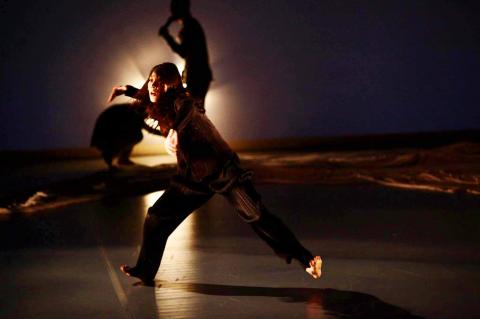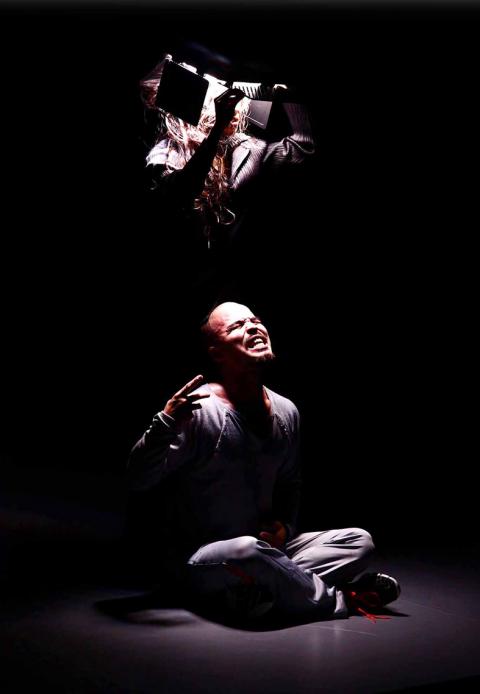Liu Kuan-hsiang’s (劉冠詳) life has been the kind of tale one usually finds in novels or films: frequently changing schools as a child because he liked to fight, stealing scooters to sell for parts as a young teen, doing so well in the high-school entrance exam that he had his pick of schools, deciding to study dance because that was where the girls were, going to college, then at 22 losing his dad and at 27 finding himself taking care of his terminally ill mother.
Since Liu is a dancer and choreographer, he channels his experiences into dances.
In 2014, he created Hero (The Battle With My Father) (英雄) about his struggle to come to terms with his father’s life and death after a heart attack at age 49, including his battle to get his father back to Taiwan. The show had more than one audience member telling Liu afterwards that they had cried — including Horse (驫舞劇場) artistic director Chen Wu-kang (陳武康).

Photo courtesy of Su We-chia
Liu created a piece for Horse’s Duets (兩對) program at the Experimental Theater in December last year that was about taking care of his mother in a hospice. Performed with his wife, Chien Ching-ying (簡晶瀅),the raw emotion of Liu’s work made for a powerful viewing.
His latest work, Kids (我知道的太多了), which will be performed this weekend at the Cloud Gate Theater, is about his mother’s illusions/delusions as the cancer she had lived with for almost 18 years turned terminal, a brain tumor gradually robbing her of her sight and the use of her legs.
Liu and his mom loved to go to the movies together. When she began to have delusions — telling him that he had to run away because the doctors or some producers wanted to kill him — Liu said he realized that those illusions were like movies, but ones that he could not see or share with her.

Photo courtesy of Su We-chia
So he began to record their conversations as well of those she had with her doctors, knowing that someday he might want to use them in a work.
It is not as cold-hearted as it might sound.
“My mom was jealous that I made a show about my dad. After she saw it, she asked: ‘Why don’t you do a show about me,” Liu said.
He uses some of those recordings in Kids, though he said he was hard working on a show so soon after his mother’s death.
“It was difficult to rehearse, listening to Mom; [the feelings] so raw. Using English [for his monologues] helped give me distance... Chinese was too close to home,” he said.
Liu said he portrays both himself and his mother in the show, accompanied by Jian as well as Lin Yu-ju (林祐如).
Asked why he chose Kids as the English-language title when the Chinese one translates as “I know too much,” Liu said that he feels stuck between the fantasies of childhood and the illusions of the dying, while death holds no terrors for him.
“I know too much now,” he said. “Death is a joker watching you, everything you think is useless.”
However, Kids is not morbid.
“I hope people will see the show and it will remind them to contact their families,” Liu said.

In the March 9 edition of the Taipei Times a piece by Ninon Godefroy ran with the headine “The quiet, gentle rhythm of Taiwan.” It started with the line “Taiwan is a small, humble place. There is no Eiffel Tower, no pyramids — no singular attraction that draws the world’s attention.” I laughed out loud at that. This was out of no disrespect for the author or the piece, which made some interesting analogies and good points about how both Din Tai Fung’s and Taiwan Semiconductor Manufacturing Co’s (TSMC, 台積電) meticulous attention to detail and quality are not quite up to

April 21 to April 27 Hsieh Er’s (謝娥) political fortunes were rising fast after she got out of jail and joined the Chinese Nationalist Party (KMT) in December 1945. Not only did she hold key positions in various committees, she was elected the only woman on the Taipei City Council and headed to Nanjing in 1946 as the sole Taiwanese female representative to the National Constituent Assembly. With the support of first lady Soong May-ling (宋美齡), she started the Taipei Women’s Association and Taiwan Provincial Women’s Association, where she

Chinese Nationalist Party (KMT) Chairman Eric Chu (朱立倫) hatched a bold plan to charge forward and seize the initiative when he held a protest in front of the Taipei City Prosecutors’ Office. Though risky, because illegal, its success would help tackle at least six problems facing both himself and the KMT. What he did not see coming was Taipei Mayor Chiang Wan-an (將萬安) tripping him up out of the gate. In spite of Chu being the most consequential and successful KMT chairman since the early 2010s — arguably saving the party from financial ruin and restoring its electoral viability —

It is one of the more remarkable facts of Taiwan history that it was never occupied or claimed by any of the numerous kingdoms of southern China — Han or otherwise — that lay just across the water from it. None of their brilliant ministers ever discovered that Taiwan was a “core interest” of the state whose annexation was “inevitable.” As Paul Kua notes in an excellent monograph laying out how the Portuguese gave Taiwan the name “Formosa,” the first Europeans to express an interest in occupying Taiwan were the Spanish. Tonio Andrade in his seminal work, How Taiwan Became Chinese,